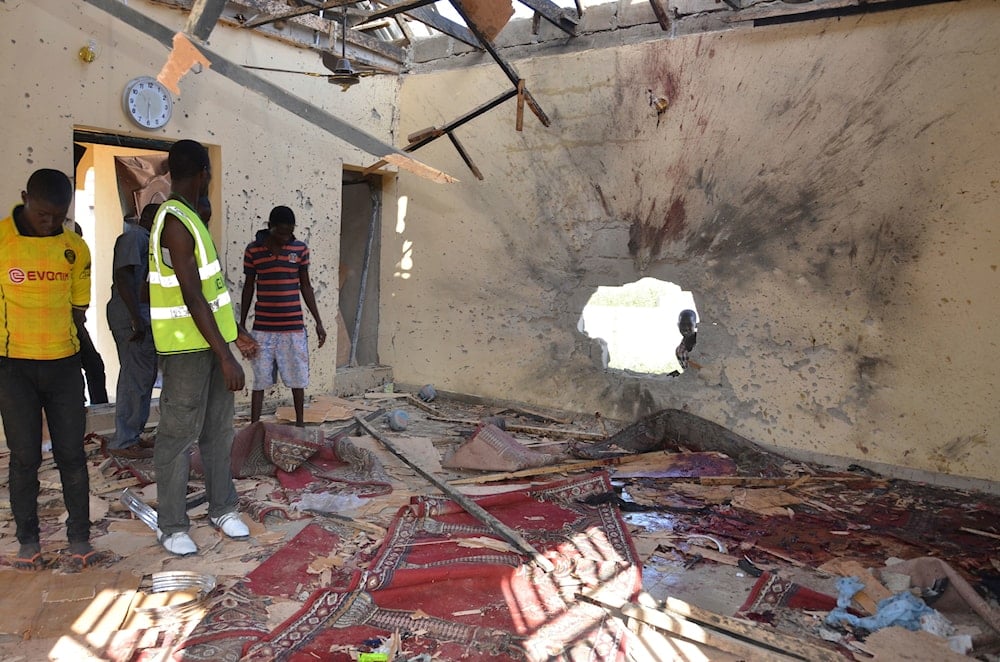US Congressman drops bombshell: USAID funded terrorism
In a viral video, US Congressman Scott Perry accuses USAID of funneling $697 million annually to terrorist groups like ISIS, Al-Qaeda, and Boko Haram.
-

In this Friday, Oct. 23, 2015, file photo, people inspect a damaged mosque following a Boko Haram attack in Maiduguri, Nigeria. (AP)
During a recent House hearing, US Congressman Scott Perry leveled serious accusations against the United States Agency for International Development (USAID), stating the agency had inadvertently funded terrorist organizations, including ISIS, Al-Qaeda, and Boko Haram. His statements reignited debates over USAID’s operations and financial oversight.
Perry, a Republican representing Pennsylvania, voiced his concerns at the inaugural meeting of the Subcommittee on Delivering on Government Efficiency (DOGE), a body established by former President Donald Trump and chaired by billionaire Elon Musk. Amid the controversy, USAID has reportedly halted its global operations.
In a viral one-minute video, Perry declared, "Your money, $697 million annually, plus shipments of cash, funds ISIS, Al-Qaeda, Boko Haram, ISIS Khorasan, and terrorist training camps."
He also condemned USAID's allocation of $136 million for constructing 120 schools in Pakistan, asserting that there is "zero evidence" the schools were ever built.
The recent development comes after a broader campaign by Musk, who is spearheading Trump's government cost-cutting initiative, aimed at reducing federal spending and eliminating programs deemed unnecessary. During a discussion on X, alongside former presidential candidate Vivek Ramaswamy and Republican Senators Joni Ernst and Mike Lee, Musk emphasized that dismantling USAID was a priority under Trump's agenda.
The controversy has intensified debates over US foreign aid and funding terrorism, with Perry's remarks sparking fresh questions about accountability.
USAID; a tool of political influence?
While the Trump administration has gone after USAID over wasteful spending of American taxpayer dollars, this does not come without historical precedent. The agency has repeatedly faced allegations of covert activities and political interference in several countries over the years as in Cuba, in the ZunZuneo Project, Bolivia, through support for opposition groups, Russia, for alleged economic reform through the Harvard Institute for International Development, Brazil, through influence on political reforms, and Peru, in a forced sterilization campaign.
The agency’s critics argue that it often oversteps its mandate, engaging in activities that serve political rather than humanitarian goals. They point to instances of alleged wasteful spending and covert operations as evidence of systemic issues within the agency.
In an interview for Al Mayadeen earlier this month, Margaret Kimberley, Executive Editor and Senior Columnist at Black Agenda Report, described USAID as a "dual-purpose agency"; providing aid while acting as an arm of US intelligence to serve its geopolitical interests.
Citing Syria as a prime example, she explained how the US used USAID alongside armed groups to destabilize the government and impose foreign influence.
In an interview for #AlMayadeen, Margaret Kimberley, Executive Editor and Senior Columnist at Black Agenda Report, described USAID as a dual-purpose agency; providing aid while acting as an arm of US intelligence to serve its geopolitical interests.
— Al Mayadeen English (@MayadeenEnglish) February 5, 2025
Citing Syria as a prime… pic.twitter.com/WMkF5nrOWA
She also noted that sanctions played a critical role in weakening Syria, making it vulnerable to external control. Regarding domestic US politics, Kimberley criticized President Donald Trump’s efforts to reshape USAID, arguing that his goal was not to dismantle it but to consolidate its power under the State Department for greater control.
She further pointed to Elon Musk’s involvement in serving "as a propaganda arm, saying that USAID is Marxist-Leninist," as part of a broader propaganda strategy.

 3 Min Read
3 Min Read










